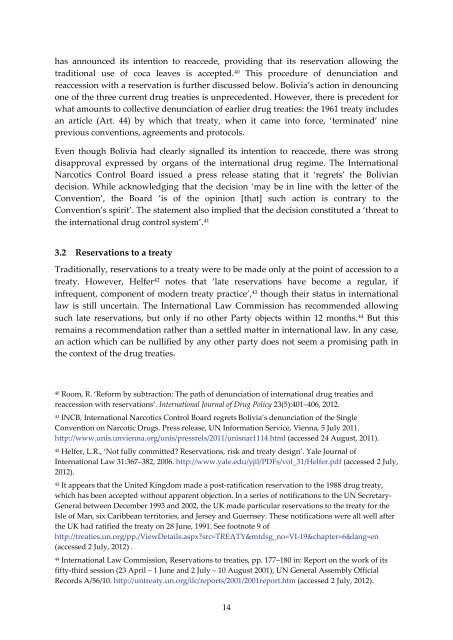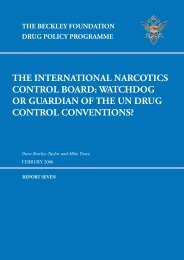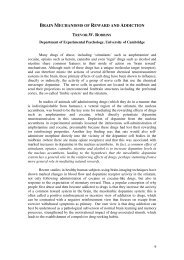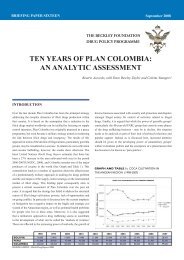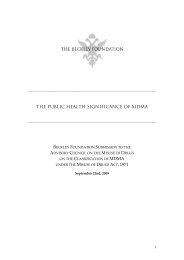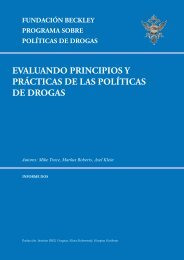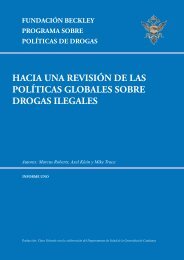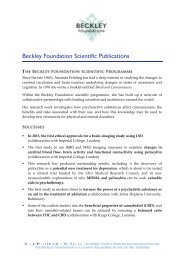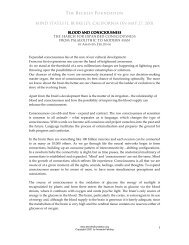would probably be more easily implemented. With respect <strong>to</strong> <strong>the</strong> provisions concerningdomestic law which conflict with <strong>the</strong> 1961, 1971 or 1988 treaty, <strong>the</strong> new treaty can beargued <strong>to</strong> take precedence <strong>un</strong>der <strong>the</strong> ‘last in time’ principle.An alternative path, which would be more radical in effect but might be more easilyaccepted, would be <strong>to</strong> start again, and <strong>to</strong> propose a new Single Convention covering allpsychoactive substances, including those not now controlled <strong>un</strong>der <strong>the</strong> <strong>drug</strong> treaties.This option is fur<strong>the</strong>r discussed in Chapter 4 below.3. Actions which can be taken individually by any Party, or byParties acting in parallelThere are a number of actions which can be taken <strong>un</strong>ilaterally by States which areParties <strong>to</strong> <strong>the</strong> treaties. These individual actions could also be co-ordinated between likemindedParties. The latter might have advantages both in terms of <strong>the</strong> signal which <strong>the</strong>action conveys, and in terms of diminishing <strong>the</strong> effects of any opprobrium orco<strong>un</strong>termeasures from o<strong>the</strong>r states that <strong>the</strong> actions may attract. 383.1 Den<strong>un</strong>ciation of one or more of <strong>the</strong> treatiesAfter a period of notice, a co<strong>un</strong>try can deno<strong>un</strong>ce (withdraw from) any of <strong>the</strong><strong>conventions</strong>. For <strong>the</strong> 1961 and 1971 treaties, <strong>the</strong> withdrawal takes effect on <strong>the</strong> nextJanuary 1 which is at least 6 months after <strong>the</strong> den<strong>un</strong>ciation is received by <strong>the</strong> UNSecretary-General (Arts. 46 and 19, respectively). 39 For <strong>the</strong> 1988 treaty, it takes effect oneyear after <strong>the</strong> Secretary-General receives <strong>the</strong> den<strong>un</strong>ciation (Art. 30). On 29 J<strong>un</strong>e 2011,Bolivia deno<strong>un</strong>ced <strong>the</strong> 1961 Convention, acting <strong>the</strong>n so that <strong>the</strong> den<strong>un</strong>ciation would takeeffect at <strong>the</strong> beginning of 2012. This action was taken after it had become clear that itseffort <strong>to</strong> change <strong>the</strong> 1961 treaty’s provisions on coca leaves would not succeed. Bolivia38Bewley-Taylor, D. Toward revision of <strong>the</strong> UN <strong>drug</strong> control <strong>conventions</strong>: <strong>the</strong> logic and dilemmas oflike-minded groups. London: International Drug Policy Consortium, Series on Legislative Reform ofDrug Policies No. 19, March 2012. http://www.tni.org/sites/www.tni.org/files/download/dlr19.pdf(accessed 2 July, 2012).39It is not clear what <strong>the</strong> effect of a den<strong>un</strong>ciation of <strong>the</strong> 1961 treaty would have on status as a Party <strong>to</strong><strong>the</strong> 1972 Pro<strong>to</strong>col. In o<strong>the</strong>r such situations, it appears <strong>to</strong> be assumed that deno<strong>un</strong>cing <strong>the</strong> treaty alsodeno<strong>un</strong>ces <strong>the</strong> pro<strong>to</strong>col [e.g., Official Commentary on Pro<strong>to</strong>col Additional <strong>to</strong> <strong>the</strong> Geneva Conventionsof 12 August 1949, and relating <strong>to</strong> <strong>the</strong> Protection of Victims of Non-International Armed Conflicts(Pro<strong>to</strong>col II), 8 J<strong>un</strong>e 1977, p. 1110, 3846: “A State Party <strong>to</strong> <strong>the</strong> Conventions and <strong>to</strong> <strong>the</strong> Pro<strong>to</strong>col maydeno<strong>un</strong>ce <strong>the</strong> Pro<strong>to</strong>col without deno<strong>un</strong>cing <strong>the</strong> Conventions; <strong>the</strong> converse is not possible”.http://www.icrc.org/ihl.nsf/COM/470-750126, accessed 8 July, 2012]. But if <strong>the</strong>re is a reaccession, <strong>the</strong>Pro<strong>to</strong>col provides (Art. 19 §a) that any state acceding <strong>to</strong> <strong>the</strong> 1961 treaty after August 1975, when <strong>the</strong>Pro<strong>to</strong>col entered in force, will “be considered as a Party <strong>to</strong> <strong>the</strong> Single Convention as amended”. In thiscase, presumably <strong>the</strong> 1961 treaty’s provisions on reservations would apply also <strong>to</strong> <strong>the</strong> amendmentsresulting from <strong>the</strong> 1972 Pro<strong>to</strong>col, so that reservations could be made on any part of <strong>the</strong> treaty (butwith scope for objections <strong>to</strong> <strong>the</strong> reservation for specified articles). Concerning reservations, see section3.2 below.13
has anno<strong>un</strong>ced its intention <strong>to</strong> reaccede, providing that its reservation allowing <strong>the</strong>traditional use of coca leaves is accepted. 40 This procedure of den<strong>un</strong>ciation andreaccession with a reservation is fur<strong>the</strong>r discussed below. Bolivia’s action in deno<strong>un</strong>cingone of <strong>the</strong> three current <strong>drug</strong> treaties is <strong>un</strong>precedented. However, <strong>the</strong>re is precedent forwhat amo<strong>un</strong>ts <strong>to</strong> collective den<strong>un</strong>ciation of earlier <strong>drug</strong> treaties: <strong>the</strong> 1961 treaty includesan article (Art. 44) by which that treaty, when it came in<strong>to</strong> force, ‘terminated’ nineprevious <strong>conventions</strong>, agreements and pro<strong>to</strong>cols.Even though Bolivia had clearly signalled its intention <strong>to</strong> reaccede, <strong>the</strong>re was strongdisapproval expressed by organs of <strong>the</strong> international <strong>drug</strong> regime. The InternationalNarcotics Control Board issued a press release stating that it ‘regrets’ <strong>the</strong> Boliviandecision. While acknowledging that <strong>the</strong> decision ‘may be in line with <strong>the</strong> letter of <strong>the</strong>Convention’, <strong>the</strong> Board ‘is of <strong>the</strong> opinion [that] such action is contrary <strong>to</strong> <strong>the</strong>Convention’s spirit’. The statement also implied that <strong>the</strong> decision constituted a ‘threat <strong>to</strong><strong>the</strong> international <strong>drug</strong> control system’. 413.2 Reservations <strong>to</strong> a treatyTraditionally, reservations <strong>to</strong> a treaty were <strong>to</strong> be made only at <strong>the</strong> point of accession <strong>to</strong> atreaty. However, Helfer 42 notes that ‘late reservations have become a regular, ifinfrequent, component of modern treaty practice’, 43 though <strong>the</strong>ir status in internationallaw is still <strong>un</strong>certain. The International Law Commission has recommended allowingsuch late reservations, but only if no o<strong>the</strong>r Party objects within 12 months. 44 But thisremains a recommendation ra<strong>the</strong>r than a settled matter in international law. In any case,an action which can be nullified by any o<strong>the</strong>r party does not seem a promising path in<strong>the</strong> context of <strong>the</strong> <strong>drug</strong> treaties.40Room, R. ‘Reform by subtraction: The path of den<strong>un</strong>ciation of international <strong>drug</strong> treaties andreaccession with reservations’. International Journal of Drug Policy 23(5):401–406, 2012.41INCB, International Narcotics Control Board regrets Bolivia’s den<strong>un</strong>ciation of <strong>the</strong> SingleConvention on Narcotic Drugs. Press release, UN Information Service, Vienna, 5 July 2011.http://www.<strong>un</strong>is.<strong>un</strong>vienna.org/<strong>un</strong>is/pressrels/2011/<strong>un</strong>isnar1114.html (accessed 24 August, 2011).42Helfer, L.R., ‘Not fully committed? Reservations, risk and treaty design’. Yale Journal ofInternational Law 31:367–382, 2006. http://www.yale.edu/yjil/PDFs/vol_31/Helfer.pdf (accessed 2 July,2012).43It appears that <strong>the</strong> United Kingdom made a post-ratification reservation <strong>to</strong> <strong>the</strong> 1988 <strong>drug</strong> treaty,which has been accepted without apparent objection. In a series of notifications <strong>to</strong> <strong>the</strong> UN Secretary-General between December 1993 and 2002, <strong>the</strong> UK made particular reservations <strong>to</strong> <strong>the</strong> treaty for <strong>the</strong>Isle of Man, six Caribbean terri<strong>to</strong>ries, and Jersey and Guernsey. These notifications were all well after<strong>the</strong> UK had ratified <strong>the</strong> treaty on 28 J<strong>un</strong>e, 1991. See footnote 9 ofhttp://treaties.<strong>un</strong>.org/pp./ViewDetails.aspx?src=TREATY&mtdsg_no=VI-19&chapter=6&lang=en(accessed 2 July, 2012) .44International Law Commission, Reservations <strong>to</strong> treaties, pp. 177–180 in: Report on <strong>the</strong> work of itsfifty-third session (23 April – 1 J<strong>un</strong>e and 2 July – 10 August 2001), UN General Assembly OfficialRecords A/56/10. http://<strong>un</strong>treaty.<strong>un</strong>.org/ilc/reports/2001/2001report.htm (accessed 2 July, 2012).14
- Page 2 and 3: ROADMAPS TO REFORMINGTHE UN DRUG CO
- Page 4 and 5: ContentsPreface ...................
- Page 6 and 7: PrefaceTHE IDEA FOR this Report cam
- Page 8: PART I. POSSIBLE ROADMAPS
- Page 11 and 12: hope for serious progress, but we c
- Page 13 and 14: We do not underestimate the difficu
- Page 15 and 16: also imposes requirements concernin
- Page 17 and 18: domestic market, just as producers
- Page 19 and 20: Protocol strengthened some provisio
- Page 21: ut considerably less potency than s
- Page 25 and 26: objected to. Concerning the 1971 tr
- Page 27 and 28: Table 2. Summary of reservations to
- Page 29 and 30: Reservations about traditional use
- Page 31 and 32: As Swaine notes, ‘the Vienna Conv
- Page 33 and 34: unhappy about a country implementin
- Page 35 and 36: Preemption by a new ‘single conve
- Page 37 and 38: and their effort was rejected by a
- Page 39 and 40: national or subnational level. Proh
- Page 42 and 43: Chapter 5. Proposed treaty amendmen
- Page 44 and 45: Article 1. DefinitionsExcept where
- Page 46 and 47: Article 36 - penal provisionsIn Art
- Page 48 and 49: Article 7. Special Provisions regar
- Page 50 and 51: and to ensure adequate supplies of
- Page 52 and 53: Article 1 − definition of ‘cons
- Page 54 and 55: Article 19 - estimates of drug requ
- Page 56 and 57: Article 21. Limitation of Manufactu
- Page 58 and 59: contrary to a law or regulation ado
- Page 60 and 61: 1. in subparagraph (a):a) after ‘
- Page 62 and 63: ) for ‘in accordance with paragra
- Page 64 and 65: include a number of general stateme
- Page 66 and 67: the legality of drug possession. A
- Page 68 and 69: Chapter 7. Conforming the 1961 Conv
- Page 70 and 71: solely by Article 30, which require
- Page 72 and 73:
on trade activities referred to in
- Page 74 and 75:
(c) Require that licensed manufactu
- Page 76 and 77:
issued in the form of counterfoil b
- Page 78:
APPENDIXDETAILED COMMENTARY ON AMEN
- Page 81 and 82:
Articles 21-34 of the Convention im
- Page 83 and 84:
dispatch, transport, supply, purcha
- Page 85 and 86:
actions involving commercial quanti
- Page 87 and 88:
In the 1971 Convention the followin
- Page 89 and 90:
4.1.3 Option 2 - changes to Preambl
- Page 91 and 92:
separate estimates and statistical
- Page 93 and 94:
After ‘scientific research’, in
- Page 95 and 96:
would also include transforming a d
- Page 97 and 98:
(c) subject to the provisions of th
- Page 99 and 100:
endangered’ by a Party’s failur
- Page 101 and 102:
Article 9. Composition and Function
- Page 103 and 104:
2. The Board shall, in respect of c
- Page 105 and 106:
for the right of the INCB to establ
- Page 107 and 108:
) Subject to the deductions referre
- Page 109 and 110:
excess quantity must be deducted fr
- Page 111 and 112:
prohibition in Article 31(1)(b) aga
- Page 113 and 114:
4.8 Article 20 - statistical return
- Page 115 and 116:
separate returns would be required
- Page 117 and 118:
4.9.1 General comments on Article 2
- Page 119 and 120:
distributors), and any quantity tak
- Page 121 and 122:
a) The quantity consumed, within th
- Page 123 and 124:
Article 21 bis. Limitation of Produ
- Page 125 and 126:
to engage in cultivation; and culti
- Page 127 and 128:
the purposes of Option 2. However,
- Page 129 and 130:
in Article 29 to manufacture of mor
- Page 131 and 132:
) (i) Require medical prescriptions
- Page 133 and 134:
4.15 Article 31(1) - international
- Page 135 and 136:
commercial use. Export to a state o
- Page 137 and 138:
would automatically mean that posse
- Page 139 and 140:
preparatory acts, conspiracy and at
- Page 141 and 142:
offering for sale, distribution, 17
- Page 143 and 144:
Article 36. Penal Provisions1. a) S
- Page 145 and 146:
Article 36. Penal Provisions1. a) S
- Page 147 and 148:
Conference would have intended to a
- Page 149 and 150:
drugs (in more than small quantitie
- Page 151 and 152:
substances into its country or one
- Page 153 and 154:
apply to Schedule 1 substances. In
- Page 155 and 156:
substances (of more than a small qu
- Page 157 and 158:
1. The Parties shall require that t
- Page 159 and 160:
individuals may lawfully obtain, us
- Page 161 and 162:
4. The Parties shall furnish to the
- Page 163 and 164:
2. In subparagraph (b):a) after ‘
- Page 165 and 166:
obligations on Parties in respect o
- Page 167 and 168:
penalise preparatory acts in connec
- Page 169 and 170:
accordance with subparagraph (a) of
- Page 171 and 172:
Article 3(1)(c)(iii) warrants speci
- Page 173 and 174:
6.1.2. Option 1 - changes to the 19
- Page 175 and 176:
uncertainty. Accordingly, Article 3
- Page 177 and 178:
Consequently, Parties would also no
- Page 179:
…4. d) The Parties may provide, e


